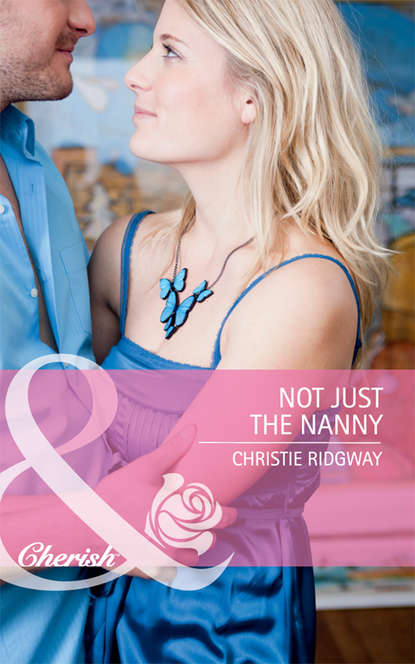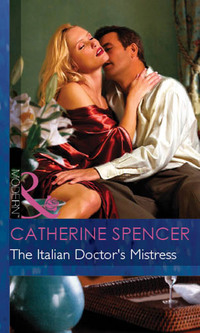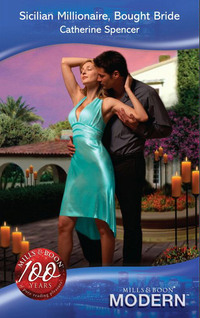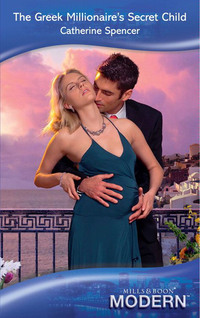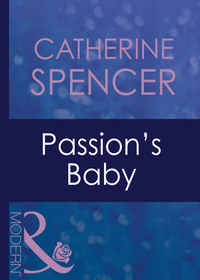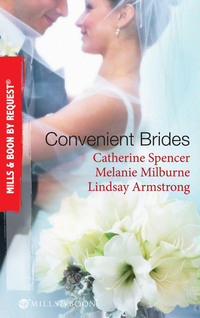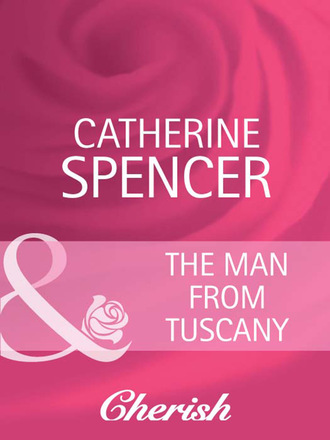
Полная версия
The Man from Tuscany
Oh, Dad! Carly stifled a horrified giggle. You have no idea how close to the truth you’ve come!
Unruffled, her grandmother said, “Not quite, Taylor. I want to go to Florence, that’s all, and I’ve asked Carly to make the travel arrangements.”
“Florence, as in Italy?” Grace fairly choked on the question.
“The very same, dear. It’s always been one of my favorite cities.”
If she’d hoped to fool anyone into believing she hadn’t dropped news on par with a minor earthquake, Grace soon disabused her of that notion. “And Carly, of course, has explained it’s absolutely out of the question.”
“That was my first reaction,” Carly admitted, “but now that I’ve had chance a to think about it, it doesn’t strike me as such a bad idea, after all.”
Her mother stared at her, slack-jawed. “Why in the world would you encourage such a foolish request?”
“Why is it foolish, Mom? What’s to stop Gran from going to Italy if she wants to?”
“Well, her age, for one thing. And if that’s not enough, how about the fact that she can barely make it from her suite to the dining room without a blast of oxygen to get her there? A journey like this will kill her.”
“Rubbish, Grace!” Anna declared. “I’m a lot tougher than you give me credit for. Provided I take my medication and travel first-class, both of which I intend to do, I’ll be just fine.”
“I swear you get dottier by the day!” Frustrated, Grace appealed to her husband. “Taylor, talk some sense into your mother-in-law.”
“It is a fair distance for a woman your age to travel alone, Anna, especially considering your health problems,” he pointed out mildly.
“I’ll hardly be alone, dear. I’m sure Carly will take me to Boston, check me in at Logan, and see to it that I have a wheelchair. And the flight attendants are very kind. They’ll keep an eye on me.”
But she wasn’t winning them over, Carly saw. Her mother’s face registered growing outrage. Her father, ever the voice of calm reason when the unexpected or unusual occurred, looked distinctly perturbed. And in truth, Carly herself was beginning to have doubts. Her grandmother’s secret might have struck a romantic chord in the telling, but when put to the test, grand passion wasn’t stacking up so well against the practicalities.
Her father cleared his throat. “Look, we came by because it’s such a lovely day we decided to take you for lunch at that place on the beach you like. Why don’t we do that and talk about this some more?”
“That’s very considerate of you, Taylor,” Anna replied, “but there’s nothing to talk about. I’ve made up my mind, and that’s that.”
“Why are you being so difficult?” Grace snapped. “Can’t you see we’re worried about you?”
“I know that, and if joining you for lunch will make you happy…”
“I’m not happy, Mother, but when did that ever keep you from doing what you wanted? And the subject is far from closed. Now, you’re going to need a sweater—it’s always breezy down by the water. We’ll have to hurry, or we’ll end up waiting for a table.”
Annoyed, Carly said in an aside, “You know she can’t keep up with you, Mom. If you’re worried about having to stand in line, you and Dad go ahead, and I’ll bring Gran in my car when she’s ready.”
Anna waited until they were alone again, then smiled gratefully at Carly. “Convincing your mother I don’t have one foot in the grave tends to sap my energy,” she said. “Thank you for buying me a reprieve, precious.”
“I figured we need it. We have to decide how we’re going to handle this, Gran. If Mom gets an inkling of what’s really going on here—”
Anna nodded. “I’ve stirred up quite the hornet’s nest as it is.”
“Exactly. Let’s not make matters any worse.” Carly sent her a glance. “Does she have any idea that you’ve been in love for years with a man who wasn’t your husband?”
“Good heavens, no! Marco and I maintained the utmost discretion. I doubt she even remembers who he is.”
But that wasn’t necessarily accurate, as Carly discovered when they reached the restaurant and Anna stopped to chat with a friend at another table, leaving Carly a few minutes alone with her parents.
“I checked with our travel agent,” her father began as soon as she joined them. “It’s just as we thought. There are no direct flights from Boston to Florence. At the very least, your grandmother would have to fly to Washington, then change planes again in Munich or Milan, and I’m afraid your mom might be right, Carly. That’s more than Anna can handle. Is there any chance you can talk her into settling for somewhere closer, like Bermuda or the Bahamas?”
“I doubt it, Dad. She’s pretty set on Italy.”
“I’ll bet she is,” Grace said with some bitterness. “She probably hopes that if she returns to the scene of her youth, it’ll give her a new lease on life.”
Taylor nodded thoughtfully. “Nostalgia can be a powerful thing for someone your mother’s age, honey.”
“Some memories are better left untouched, Taylor. If she goes ahead with this, we’ll never see her again.”
“I don’t agree. Despite everything she’s gone through, Anna’s never once cracked under pressure. And realistically, if she’s determined to take this trip, you can’t very well forbid her to go. The best we can do is insist one of us goes with her.”
Appalled at what that might lead to, Carly said, “She’ll never agree to that.”
“She might, if you were to volunteer,” her father said reasonably. “After all, you’re her beloved only grandchild. You’re a nurse, so you’re qualified to monitor her health. You recently resigned your hospital position, which means you have the summer free before going back to university in the fall. And as far as I know, you’re unattached.” He held up five fingers. “Have I missed anything?”
“Yes, Dad,” she said, seeing her grandmother coming toward them, and fully aware that where this proposed trip was concerned, three would definitely be a crowd. “Gran might not want me along for the ride.”
“Now that is something I’ll talk her into. In fact, I’ll insist on it,” Grace announced. She barely waited until her mother was seated before wading in. “This whole idea of traipsing halfway around the world all by yourself simply isn’t feasible, Mother. Travel is confusing at the best of times, especially for someone your age.”
“Well, I’m not dead yet, dear,” Anna replied. “I’m able to ask for help, if I need it.”
“What Grace is saying,” Taylor explained, “is that she— we— would feel a lot more comfortable if you didn’t go alone. So we’re wondering how you’d feel about Carly joining you.”
“Carly?” Her face lit up with pleasure. “I’d be delighted to have her as my traveling companion, provided she doesn’t mind being saddled with me.”
“I don’t mind, if you don’t,” Carly said, sliding her a conspiratorial glance. “I’ve never been to Italy.”
“That settles it, then.” Taylor lifted his water glass in a toast. “Here’s to a safe, successful trip!”
They all seconded that, Carly’s mother with markedly less enthusiasm than the rest of them.
“Cheer up, dear,” Anna urged. “Think of it as an adventure, one last glorious fling before I reconcile myself to terminal old age and day trips to Newport.”
She would’ve been wiser to keep quiet, because Grace rounded on her fretfully. “Day trips I can understand. But Italy, Mother? And why now, for heaven’s sake?”
Carly the nurse understood why, whether or not Carly the granddaughter wanted to acknowledge it. Her grandmother rightly sensed her time was running out but realized that to say so would’ve been as cruel as revealing the part Marco had played in her life.
“Because I’d like to go to Florence and see the Duomo and Michelangelo’s David one more time. And because I’d love to be the one to introduce them to my granddaughter,” she said instead.
“But where will you stay?” Grace asked. “You’ve never liked big hotels, Mother.”
“With the son of an old friend who lives not far from the city. He has plenty of room and I have a standing invitation to visit anytime. Carly, I know, will be welcome, too.”
Defeated, Grace sighed. “And when is this visit to take place?”
“As soon as possible, dear,” Anna said.
C ARLY SECURED reservations for the following Tuesday, flying via Boston to Washington, and from there to England, where they’d spend the night before embarking on the last leg of the journey to Florence. In the five days before their departure, she took care of all the details, and worried that her grandmother had taken on more than she’d bargained for.
“Even with a night in London, you’re going to find the journey tiring,” she warned, as they boarded the Boeing 777 for the transatlantic flight. “This part alone lasts nearly seven and a half hours.”
But nothing could diminish Anna’s enthusiasm. Adding a thick folder to the items to be included in her carry-on bag, she said blithely, “The good news is, I can spend it telling you the rest of my story.”
Which would have been fine, Carly reflected morosely—except she was no longer sure she wanted to hear it.
CHAPTER THREE
F INALLY , we’re on our way. The seat belt sign is off, the aircraft is headed east, and it’s time for me to pick up my story from where I left it last week. I only have until tomorrow to convince Carly that I’m not some foolish old woman pinning all her hopes on yesterday, and Marco wasn’t a home-wrecker who came between me and her beloved grandpa.
“I phoned Marco again on Sunday, to tell him you’re coming with me,” I begin. “He’s a little concerned that you might not understand the part he’s played in my life.”
“I’m not sure I do, Gran,” she says.
“I know, darling.” I pat her hand. “But you will by the time we get to Florence.”
“And how does he feel about having me underfoot all summer?”
“He can’t wait for us to arrive.” In fact, his last words before we hung up were, Please hurry. I don’t want to be apart from you a day longer than necessary.
“I wonder if he remembers saying almost the exact same words to me, the first time we said goodbye,” I murmur. “Probably not. Men don’t usually recall such things, and so much has happened since then. But I remember the moment so vividly that I’m breaking out in goose bumps.”
“Well, you don’t have to talk about it if you don’t want to, Gran,” Carly says.
“But I do,” I tell her. “How else can I make you understand?”
She shrugs, and I know she won’t easily forgive what she sees as a betrayal of her family. Steeling myself, I begin….
O N MY LAST NIGHT in Florence, he was waiting for me at our usual place, near the main door to Santa Maria Novella. A high summer moon glimmered over the black-and-white marble facade of the old church, and laid patterns of light on the deserted flagstones of the piazza.
Hearing my footsteps, he stepped out of the shadows and without a word took me in his arms. I sank against him, imprinting in my mind the solid feel of his body, the scent of his skin, the taste of his mouth on mine, because they were all I’d have to sustain me during the months we’d be apart.
In the morning, my aunt, cousin and I would board the train for Paris, on the first part of the long trip to Southampton, where the Queen Mary was scheduled to cross the Atlantic on August 30. “And not a moment too soon,” my aunt had fussed as she supervised the packing of our travel trunks. “The sooner we’re away from this benighted continent and all its troubles, the better.”
“How do I let you go, amore mio? ” Marco murmured, burying his face in my hair.
The tears I’d sworn I wouldn’t let fall clogged my voice. “It’s only for a little while.” For as long as it takes me to overcome my parents’ objections, I added silently, knowing they’d resist any idea of my marrying a foreigner, let alone one I’d known so briefly, but resolved that nothing would dissuade me from returning to Florence before year’s end. “I’ll write to you every day.”
“And I to you,” he promised. “Not an hour will pass that I won’t be thinking of you and preparing for our life together.”
After that, we wasted no more time talking. Clasping hands, we hurried along the darkened streets to our special place, the room he’d taken above a bookshop not far from the Ponte Vecchio. Although I’d done my best to brighten it with fresh flowers and candles, I suppose, to anyone else’s eyes, it didn’t have much to recommend it. But to us, living as we did for the hours when we could close the door on the rest of the world, it had the only things that really mattered—privacy and a bed intended for one, but shared by two.
I was not so naive that I hadn’t learned how babies were made and what children were called if their parents weren’t married. I knew the stigma such children bore throughout their lives. Yet even armed with all this information, I had given myself to Marco within a week of meeting him, so certain was I that our lives would be forever intertwined. Abandonment, deceit, acts of God or nature or mankind, lay so far outside our realm of possibility that they had no bearing on us.
As I explain that, Carly shakes her head incredulously. “And you never doubted him? It never occurred to you that once you’d left, he’d find someone else?”
“Never.”
We were touched with a special magic that lifted us above the rest. Convinced that ours was a love so powerful that nothing could destroy it, I had ventured so far beyond the boundaries of propriety that, had I been discovered, I’d have been ruined. A social outcast, ostracized by “nice” girls and their families.
That’s what we were in those days, I tell her. “Girls,” paraded before suitable young men and taken by the highest bidder. And our chastity, along with our bloodlines, determined how much we were worth. Not until we sent out engraved cards announcing that Mrs. Charles So-and-So is at home, followed by the date and a prestigious address, were we entitled to call ourselves “women.”
No pedestrian Mrs. for me, though. I would be Signora Marco Paretti, wife of the well-known, well-respected architect. I would live in Fiesole, the hilltop town north of Florence, in a house my husband had designed especially for us and our children.
All this and more comprised my future. For now, though, we had just this one night together in our secret hideaway, and then we’d have to say goodbye.
As soon as I stepped into the room, I saw that Marco had been there earlier. Freesias were arranged in the vase which, previously, had held daisies. Rose petals lay scattered over the bed. A bottle of Chianti and two glasses stood on the small table under the window.
“Tonight we make memories which will carry us through the coming weeks,” Marco whispered, content for the moment to hold my hands and look into my eyes.
I started to cry, the beauty of the moment, of his love for me, colliding horribly with the desolation filling my soul. He pulled me close. I realized then that he was crying, too. Great, silent, helpless shudders racked his body.
We clung to each other blindly, and the heat of desire fed on our emotions and burned away everything but the need to fuse our bodies, our hearts, our minds, to give to each other everything we were, everything we had.
We held back nothing. We simply loved each other, deeply, intimately. I heard myself moan and beg in ways that, before, would have left me too embarrassed ever to face him again.
But not that night. That night, I was shameless in my greed. Nothing lay beyond the pale for either of us. Touching, tasting, scrutinizing inch by inch, using words never uttered in polite society—such were the means by which we stitched together the love that had to be strong enough to survive separation.
Not that I share such intimate details with my granddaughter, of course. They belong to Marco and me.
Too soon, first light filtered through the open window. We dressed, fumbling with our clothes as if we could delay the inevitable. But there was no postponing time. A nearby church sounded five o’clock. In four hours, the taxi would come to take my aunt, my cousin and me to the train station. By the next afternoon, I would be in England; a week from then, in America, with over three thousand miles separating me from him.
At the door, I turned for one last glimpse of our hideaway. At the crushed rose petals and the tangle of sheets on the bed. At the half-empty bottle of Chianti. At the freesias perfuming the room with their scent. I knew then that I would never again smell roses or freesias, never again taste the red wine of Tuscany, and not be assailed by the poignant sadness of that moment.
When I returned to our pensione, Genevieve snuck down to let me in. “You’re cutting it fine,” she scolded. “Momma’s up already. You’re lucky she didn’t knock on our door to make sure we’re awake.” Then, seeing that I’d been crying, she hugged me and said, “Don’t mind me, Anna. You’re back now, and she’s none the wiser. Come and wash your face with cold water, or she’ll wonder why your eyes are so red.”
Her kindness started my tears flowing again. “It nearly killed me to leave him, Genevieve.”
“Don’t dwell on that,” she said briskly. “Instead concentrate on when you’ll see him again.”
“Months from now,” I wailed, stumbling over our luggage.
In fact, I saw him just a few hours later, at the railroad station. I was about to board our train when I felt a hand at my elbow. “ Posso aiutarla, signorina? May I help you?”
For a moment, I closed my eyes, afraid I was hallucinating. But the warmth in his voice, in his touch, were all too real and left me trembling. “Thank you,” I stammered. “Grazie.”
“Prego.” Marco squeezed my arm in secret intimacy, smiled into my eyes, and in a low voice added, “ Ti amo, la mia bella. Hurry back. I don’t want to be apart from you a day longer than necessary.”
“Thank you, young man. We can manage quite well,” my aunt declared, regarding him suspiciously from the top step into the train.
“Si, signora. Buon viaggio.”
“What was that about?” she sniffed, when we’d found our seats.
“He wished us a safe journey, that’s all,” Genevieve replied for me, because I couldn’t speak. I was too busy pressing my nose to the window and watching him fade into the distance as the train pulled out of the station.
Aunt Patricia hoisted her bosom into place. “Foreigners! I don’t trust them one iota. You girls might be sorry to leave Europe behind, but I can’t wait to set foot on American soil again.”
The grand tour had come to an end, and so had my idyll. As the train thundered north through Switzerland and into France, rumblings of war brought me back to a reality unlike anything I’d experienced before. Suddenly Marco’s political leanings, which he’d hinted at in passing and then casually, as if they were of no great consequence, assumed a frightening dimension.
I recalled that he and his father were outspoken critics of Benito Mussolini, Italy’s Fascist dictator and that sometimes, on those evenings when he wasn’t with me, Marco attended partisan rallies. I might have been shielded from much of the news, but even I recognized that although the sun shone on Florence and turned the River Arno into a swath of blue silk flowing smoothly under the city’s bridges, a dark underbelly existed beneath the ancient calm of the Uffizi and Pitti Palace.
“Well, no need to make yourself sick over that,” Genevieve told me, as the boat train approached Southampton. “If you must find something to keep you awake at night, worry about Hitler.”
But optimist though she was, Genevieve couldn’t help noticing the subdued atmosphere aboard the Queen Mary any more than I could. The luxury remained intact, but the laughter flowed less freely, and the young men who’d previously flirted with us on the dance floor now assumed a more solemn bearing.
“It’s not very promising over there,” they said, referring to the way events were shaping up in Germany. “They’ll be up to their necks in it before much longer.”
Over there. Synonymous with Europe and war, the term was on everyone’s lips, echoing along the Promenade Deck and infiltrating such exclusive retreats as the Verandah Grill. She tried to hide it, but Genevieve wasn’t immune to its aura of foreboding. “Not that we have anything to worry about,” she insisted when the Statue of Liberty rose up against the skyline and the tugs towed our ship to its berth in New York harbor. “Regardless of what happens over there, America won’t be involved.”
But Italy might be, I thought fearfully.
My parents were waiting at the dock. “We’re so relieved to have you home,” my mother cried, enveloping me in a hug that squeezed the breath from my lungs. “Your father and I have been frantic these past few days. We were so afraid you’d be stranded in England.”
“That wouldn’t have happened,” Aunt Patricia said. “I kept our passports and tickets on my person at all times.”
“But you must have heard,” my father told us gravely. “This was likely the Queen Mary’ s final run as a commercial passenger ship. On September first, just a day after you set sail from Southampton, Germany invaded Poland. On the third, Great Britain, France, Australia and New Zealand declared war on Germany.”
The news had reached us, but we hadn’t wanted to believe it. Unutterably dismayed, I asked, “How long before it’s over?”
He shook his head. “Who’s to say? It could be months—or years. It all depends on that madman, Hitler, and how soon they’re able to put a stop to him over there.”
Over there… Marco was over there, and I was here.
“You look faint, darling,” my mother said, stroking my face lovingly. “Were you seasick?”
“No,” I managed to say. “It’s the shock of hearing that countries we just visited are at war—except for Italy. It’s not involved, is it?”
“Not yet,” my father said. “But I suspect it will be, before long. Thank God you’re home safe is all I can say. For your mother and me, the worst is over.”
But it wasn’t over, not by a long shot. Although I couldn’t begin to guess its extent, the worst was yet to come….
“If talking about it upset you, Gran, you don’t have to go on,” Carly says urgently, but I shake my head, knowing I must because I’m caught up in a web of memories that won’t let me go.
“You have a letter from Italy, Anna,” my mother announced, one morning when I came down to breakfast. She flipped over the envelope, checking for a return address. “From an M. Paretti. Someone you met over there, obviously.”
“Yes,” I said, studiously avoiding her gaze. “A friend. We promised we’d keep in touch.”
I’d been home nearly two weeks. Although the skies remained clear, the days were growing shorter, the nights cooler and the maples turning color. Fall had always been my favorite season, until this year when each hour was a purgatory to be endured.
Every day, the news from Europe grew more ominous. On September 10, Canada had joined the Allies. The war had reached North American shores, after all. But Italy was still uninvolved, and the sight of that flimsy blue envelope with its foreign stamp, the first from Marco, sent such a wash of relief over me that I thought I might be sick.
My mother watched me, smiling. “Aren’t you going to read it?”
“Later.” I moved away, busying myself with the dishes our housekeeper had set on the sideboard in the breakfast room. “After I’ve eaten.”
But the bacon and hotcakes turned my stomach. “I hardly call that eating,” my father remarked, eyeing my slice of toast and cup of coffee as he rose from the table. “What happened to your appetite?”
“I’m not very hungry lately.”
“That’s not normal for a girl your age.” He paused long enough to drop a kiss on my head and another on my mother’s cheek. “Perhaps you should take her to see Dr. Grant, Isabelle. Could be she needs a tonic.”
“Your father’s right,” my mother observed after he’d gone. “Lately you’re not yourself at all, Anna. You’re pale and listless. I hope you didn’t pick up some sort of disease when you were away.”


